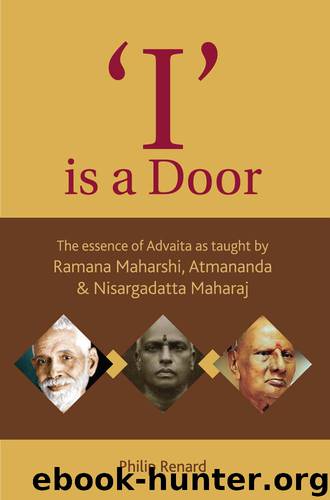'I' is a Door: The essence of Advaita as taught by Ramana Maharshi, Atmananda & Nisargadatta Maharaj by Philip Renard

Author:Philip Renard [Renard, Philip]
Language: eng
Format: mobi
Publisher: ZEN PUBLICATIONS
Published: 2017-09-02T16:00:00+00:00
‘I’ Is Term For all Levels
By dedicating yourself to this, by honouring this pinprick, this ‘consciousness’, your search ceases to exist. Here you can let go of the ‘doing’, the attempt to let yourself pass beyond this consciousness, because really that won’t help.
“You can never isolate yourself from the consciousness unless consciousness is pleased with you and gets rid of you. Consciousness opens the gate for you to transcend consciousness. There are two aspects: one is conceptual, dynamic consciousness which is full of concepts, and the other is transcendent consciousness. Even the concept ‘I am’ is not there. Conceptual, qualitative Brahman (Saguna Brahman), the one that is full of concepts and is qualitative, is the outcome of the [reflection of Awareness (Nirguna Brahman or Para Brahman) in the] functioning body.”*
So although it initially is important and correct to distinguish between consciousness (chetana) and Consciousness (or Awareness; Chit), it makes sense at a certain moment just to embrace consciousness in its being ‘the touch’, so that all resistance melts away, and with it all duality. Awareness is always already in harmony or peace with Its present object. The touch is the Helper which anoints you in your and Her surrender; it shows you that you have always been unaffected and unimpaired, free and unseparated, without the need to strive for it. So on the one hand Maharaj emphasizes:
“I, the Absolute, am not this ‘I am-ness’,”16 but on the other hand:
“Understand that this ‘I’ is not different at different levels. As the Absolute, it is the ‘I’ which in manifesting needs a form. The same Absolute ‘I’ becomes the manifested ‘I’, and in the manifested ‘I’ it is the consciousness which is the source of everything. In the manifested state it is the Absolute-with-consciousness.”17
It is striking that here, as in many other places, Maharaj keeps on using the word ‘I’ as a word for the Ultimate. Apart from calling himself very often “I, the Absolute”, he for instance says: “Nothing exists except me. Only I exist”,18 and “When the state of beingness is totally swallowed, whatever remains is that eternal ‘I’.”19
So ‘I’ appears to be the term for us on all three levels: the person thinks and feels ‘I’, the touch of beingness is the experience of ‘I’ without thinking (without ‘mine’), and the Ultimate is ‘I’, without experiencing it. This means that the Real which we are, is always so already, and now already. Also, in the midst of identification with a certain form, there is the invitation to recognize the most nearby, namely ‘I’, in its essential nature.
Is ‘I’ a door? The Teacher answers:
“There are no doors to Para Brahman, dear son.”20
Download
This site does not store any files on its server. We only index and link to content provided by other sites. Please contact the content providers to delete copyright contents if any and email us, we'll remove relevant links or contents immediately.
| Chakras | Gandhi |
| History | Rituals & Practice |
| Sacred Writings | Sutras |
| Theology |
Fingersmith by Sarah Waters(2532)
Kundalini by Gopi Krishna(2180)
Wheels of Life by Anodea Judith(2144)
Indian Mythology by Devdutt Pattanaik(1936)
The Bhagavad Gita by Bibek Debroy(1929)
The Yoga of Jesus: Understanding the Hidden Teachings of the Gospels by Paramahansa Yogananda(1860)
Autobiography of a Yogi (Complete Edition) by Yogananda Paramahansa(1824)
The Man from the Egg by Sudha Murty(1812)
The Book of Secrets: 112 Meditations to Discover the Mystery Within by Osho(1674)
Chakra Mantra Magick by Kadmon Baal(1638)
The Sparsholt Affair by Alan Hollinghurst(1585)
Sparks of Divinity by B. K. S. Iyengar(1532)
Gandhi by Ramachandra Guha(1528)
Avatar of Night by Tal Brooke(1520)
Karma-Yoga and Bhakti-Yoga by Swami Vivekananda(1491)
The Bhagavad Gita (Classics of Indian Spirituality) by Eknath Easwaran(1487)
The Spiritual Teaching of Ramana Maharshi by Ramana Maharshi(1432)
Hindoo Holiday by J. R. Ackerley(1377)
Hinduism: A Very Short Introduction (Very Short Introductions) by Knott Kim(1374)
